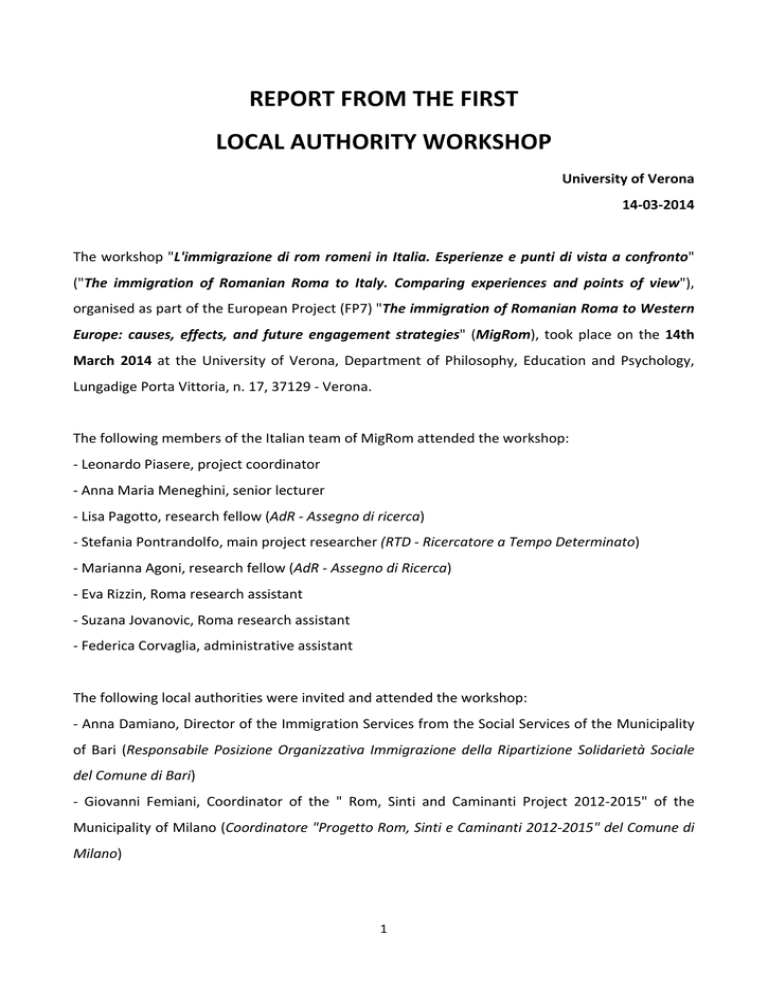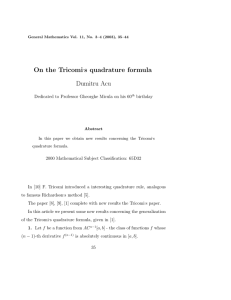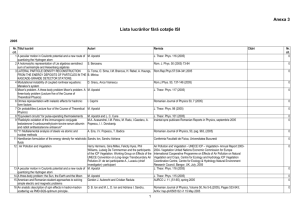REPORT FROM THE FIRST LOCAL AUTHORITY WORKSHOP
advertisement

REPORT FROM THE FIRST LOCAL AUTHORITY WORKSHOP University of Verona 14-­‐03-­‐2014 The workshop "L'immigrazione di rom romeni in Italia. Esperienze e punti di vista a confronto" ("The immigration of Romanian Roma to Italy. Comparing experiences and points of view"), organised as part of the European Project (FP7) "The immigration of Romanian Roma to Western Europe: causes, effects, and future engagement strategies" (MigRom), took place on the 14th March 2014 at the University of Verona, Department of Philosophy, Education and Psychology, Lungadige Porta Vittoria, n. 17, 37129 -­‐ Verona. The following members of the Italian team of MigRom attended the workshop: -­‐ Leonardo Piasere, project coordinator -­‐ Anna Maria Meneghini, senior lecturer -­‐ Lisa Pagotto, research fellow (AdR -­‐ Assegno di ricerca) -­‐ Stefania Pontrandolfo, main project researcher (RTD -­‐ Ricercatore a Tempo Determinato) -­‐ Marianna Agoni, research fellow (AdR -­‐ Assegno di Ricerca) -­‐ Eva Rizzin, Roma research assistant -­‐ Suzana Jovanovic, Roma research assistant -­‐ Federica Corvaglia, administrative assistant The following local authorities were invited and attended the workshop: -­‐ Anna Damiano, Director of the Immigration Services from the Social Services of the Municipality of Bari (Responsabile Posizione Organizzativa Immigrazione della Ripartizione Solidarietà Sociale del Comune di Bari) -­‐ Giovanni Femiani, Coordinator of the " Rom, Sinti and Caminanti Project 2012-­‐2015" of the Municipality of Milano (Coordinatore "Progetto Rom, Sinti e Caminanti 2012-­‐2015" del Comune di Milano) 1 -­‐ Liliana Mauri, Commissioner of the Local Police of the Municipality of Milano (Polizia Locale e Sicurezza, Settore Presidio del Territorio, S.U.O.S. Nucleo Problemi del Territorio, Comune di Milano) -­‐ Valerio Pedroni, Coordinator of the "Somaschi Onlus Foundation" (Coordinatore "Fragilità sociali" della Fondazione Somaschi Onlus di Milano), on behalf of Gian Piero Colombo, Town Councillor for the Social Politics of the Municipality of Legnano (MI) (Assessore alle Politiche Sociali e alla Coesione Sociale del Comune di Legnano (MI)) -­‐ Daniela Salvador, officer for the Immigration Policies and Social Integration Services of the Emilia-­‐ Romagna Region (Servizio politiche per l´accoglienza e l´integrazione sociale, Regione Emilia-­‐ Romagna) -­‐ Fiorita Luciano, Director of the Social Services of the Municipality of Padova (Dirigente dei Servizi Sociali del Comune di Padova) -­‐ Carmela Spanò, Welfare Worker for the Social Services of the Municipality of Padova (Assistente sociale dei Servizi Sociali del Comune di Padova) -­‐ Emanuela Tamborini, Project "Support Work for the Italian National Strategy for the Inclusion of Rom, Sinti and Caminanti" (Progetto “Supporto alla Strategia Nazionale di Inclusione dei Rom, Sinti e Caminanti”, Referente Formez per la Regione Veneto, Referente Anci per la città di Venezia) -­‐ Alessandra Moro, Director of the Adoptions Service of the Local Health Authority of Padova (Responsabile Equipe Adozioni, Unità Locale Socio Sanitaria ULSS 16, Padova) -­‐ Michela Franchetti, Welfare Worker for the Adoptions Service of the Local Health Authority of Padova (Assistente Sociale Equipe Adozioni, Unità Locale Socio Sanitaria ULSS 16, Padova) -­‐ Some exponents of the accredited agency for international adoptions "Senza Frontiere Onlus" from Padova (Ente autorizzato all'adozione internazionale Senza Frontiere Onlus di Padova) -­‐ Mosè Carrara, research fellow (AdR -­‐ Assegno di Ricerca) from the European Project (JUSTICE) "Wor(l)d which exclude" (WE) At 10.15 a.m., Prof. Leonardo Piasere opened the workshop by greeting the participants and presenting the MigRom European Project. He explained the aims and the different focuses of interest, as well as the phases of the research, what has already been carried out and what will be done in the next three years. He then introduced the MigRom Project international partners and the University of Verona research team. Afterwards, Piasere started to talk about the migration of Roma from Romania toward Western Europe, explaining briefly the history of Romanian Roma, 2 and focusing on Roma from the region of Valacchia (i.e., the region of origin of most of the Roma migrated to Italy today): they were slaves until 1856, mostly slaves of landowners (boyars), and were deeply rooted in the territory as constitutive part of its economy and society. Marianna Agoni reported the results of the first step of the research carried out by the Italian team: the mapping of the presences of Romanian Roma in Italy. After a brief exposition about the difficulties in collecting data about Roma in general, and about Romanian Roma in particular, Agoni described the outcome of this work. In short, data collected from April 2013 to January 2014 showed that the presence of Romanian Roma is widespread on the Italian territory, but the greater concentrations are in the four largest cities of Italy (Milano, Roma, Torino, Napoli) and in some other large urban areas (e.g. Bari, Catania, and others). Most of Romanian Roma that migrated to Italy come from the regions of Oltenia and Muntenia in Romania. Stefania Pontrandolfo presented some relevant issues emerged from the interviews (recorded in Milano and Bari during the pilot survey and all addressed to Romanian Roma from Oltenia). She explained the main motives of their migration (among which the severe economic crisis in Romania emerged as the most important push factor); their problematic plight and life conditions in Italy; their fears and worries about physical or symbolic acts of violence they could be victims of; their dreams and expectations for the future. Pontrandolfo then pointed out some of the crucial issues: -­‐ uncertain housing conditions (on the one hand they would like to find safe and stable housing conditions in Italy to pull themselves out of unauthorised camps, on the other hand they have a strong desire to build their own house in Romania); -­‐ job insecurity (to find a job is a priority for their survival and the sustenance of their families, so they ask for help to find a job or to promote the already existing Roma cooperatives, e.g. in Bari); -­‐ family (on the one hand, nothing matters more than children: all dreams become possible, all pains become acceptable for the well-­‐being of their children. On the other hand, many Roma fear that Italian Social Services or Juvenile Courts could take their children away from them because of their poor life conditions and/or give them up for adoption). Suzana Jovanovic spoke about her role as Roma research assistant in the pilot survey, for which she conducted interviews in Romani language. She highlighted the importance of her position that 3 was at the same time internal to the Roma, as she is a Romní from the Kañarja Roma group, but also external to the specific communities to which the interviewed Romanian Roma belonged. This special position facilitated the interviewed Roma in opening their hearts and talking with unexpected freedom about their experiences and fears, as well as about their expectations and worries. Anna Maria Meneghini and Lisa Pagotto presented the attitudes survey they will carry out by means of online questionnaires, with a methodology from Social Psychology. The aim of this survey is to investigate perceptions and attitudes of national residents in cities were Romanian Roma communities are settled. In Italy, the questionnaire will be administered both to national residents and to workers and representatives of professional groups such as police officers, welfare and social workers, and volunteers that serve in NGOs supporting Roma. In particular, the questionnaire targeted at these specific groups will also investigate problems and difficulties that volunteers and professionals may encounter when working with Romanian Roma. The researchers finally asked for the attendees collaboration in the diffusion and administration of the questionnaires and they received positive answers. After the presentation of MigRom Project, Piasere invited the representatives of local authorities from Bari and Milano to talk about their experiences. Anna Damiano described the scenario of the city of Bari, where there are 7 Roma settlements, even if only one of them is an authorised camp (equipped by electricity, current water and toilets). The Local Authorities of Bari have adopted a non-­‐intervention policy with regard to unauthorised camps, i.e., they have decided to avoid forced evictions, and to try instead to promote the inclusion of Roma both at school and in the wider social context. Despite the absence of a Regional Law dedicated to Roma inclusion and thus the impossibility to rely on regional economic resources, the Municipality is planning to build a new authorised camp with prefabs. With regard to this plan, however, the problem of the protests of other residents of Bari remains to be solved. Finally, Damiano pointed out that Italian bureaucratic restrictions in certifying the residence of people who live in camps constitute an obstacle for many policies that could support Roma. 4 Giovanni Femiani described the scenario of the city of Milano, where there are 7 authorised camps for Italian Roma or for Roma from the ex-­‐Yugoslavia countries. About 1500 Romanian Roma live in unauthorised camps and suffer continuous forced evictions. Femiani then presented the main lines of interventions that will be carry on by the " Rom, Sinti and Caminanti Project 2012-­‐2015" of the Municipality of Milano. The budget for this project is around 5.700.000 euro, and the Municipality plans to use about 2.000.000 euro for the so-­‐called Centri di Emergenza Sociale (C.E.S. -­‐ "Social Emergency Centres "), and about 2.000.000 euro for actions supporting Roma access to house and work, such as a forthcoming self-­‐build project. Moreover, Femiani highlighted that the Italian restrictions to the access to social housing are bureaucratic stumbling blocks for many policies that could help Roma inclusion. At the end of the presentations of the Local Authorities from Bari and Milano, Piasere invited all the participants to engage in a general discussion. Liliana Mauri described the experience of Local Police in Milan, and explained its mandate in terms of protection of major society and control of potentially risky situations. During the discussion, the problems associated with the adoption of Roma children also emerged as an important issue. The general discussion marked a fruitful exchange between the representative of different local authorities about some shared problems (that in most of the cases are tied to the rigidity of Italian bureaucracy), but also about different experimented local praxis and practices. At the conclusion of the workshop, taking into account the profitable exchanges and the interest demonstrated by all the participants, Piasere proposed to organise another meeting by the end of June 2014 and the participants agreed. The workshop ended at 02:00 p.m. 5


